Interview with Jennifer Siler on TTRPG speech therapy AND her interactive TTRPG themed Little Library!
I had the pleasure to chat with Jennifer Siler of Jenny Bird Speech & Language Therapy about how she’s using TTRPGs to help kids with speech skills and self advocacy and the Little Library she just started!
What is your backstory? What cool stuff do you do?
I am one of those people that gets into a million different hobbies, kind of a hobby of the year. Then I’ll dive in really intensely, and it’s all I can think about, so I’ve had lots of different hobbies. I grew up in a small town on the West Coast and felt like one of those weirdos in a small town, and I became pretty enamored with just learning and enjoying that process of finding a new exciting topic to just dive into.
I went to a small liberal arts school, Bard College, shout out!
I have this fun curiosity for things like quilting and birding and travelling.
Now, I’m really into being a speech therapist and running my business. And I love playing D&D and other TTRPGs!
I’m also a parent to a five year old who really loves going on these storytelling adventures with me as well, so it’s been really fun to do that together.
Yes! Your kiddo getting into that with you is very cool.
And I think with my type of brain that likes lots of new, exciting things and moving around, TTRPGs act as sort of an umbrella hobby where you can access so many things that keep you excited and entertained. You’re making your own world too, so that’s incredible!
You have a couple very cool projects in the works! First, can you tell me a bit about the TTRPG lending library you’re setting up?
Portland has an incredible community of lending libraries; it’s called PDX Sidewalk Joy that connects up all the different lending libraries.
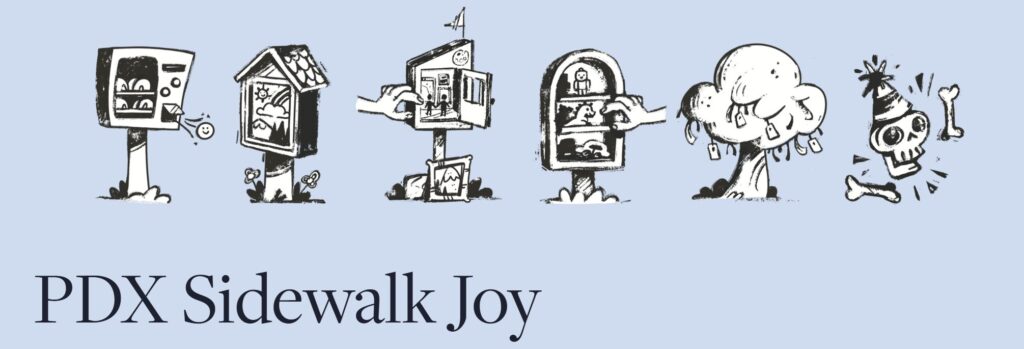
They’re like trading posts – you can take a thing, leave a thing, interact with some kind of art installation. There’s this map that was created for them all, so a fun afternoon activity that we like to do is to just travel around by bike and go visit all the different libraries.
When I started really getting into TTRPGs and storytelling through speech therapy, I saw this opportunity to use lending libraries for kids to come tell stories. I loved the idea of creating a fantasy theme, and when I started learning about painting minis… I combined all of that and got some help from my dad to create this box to put up in our yard. My kid helped me create a scene with a castle. We thrifted things to create this fantasy box with minis in it, and we just launched a few days ago!
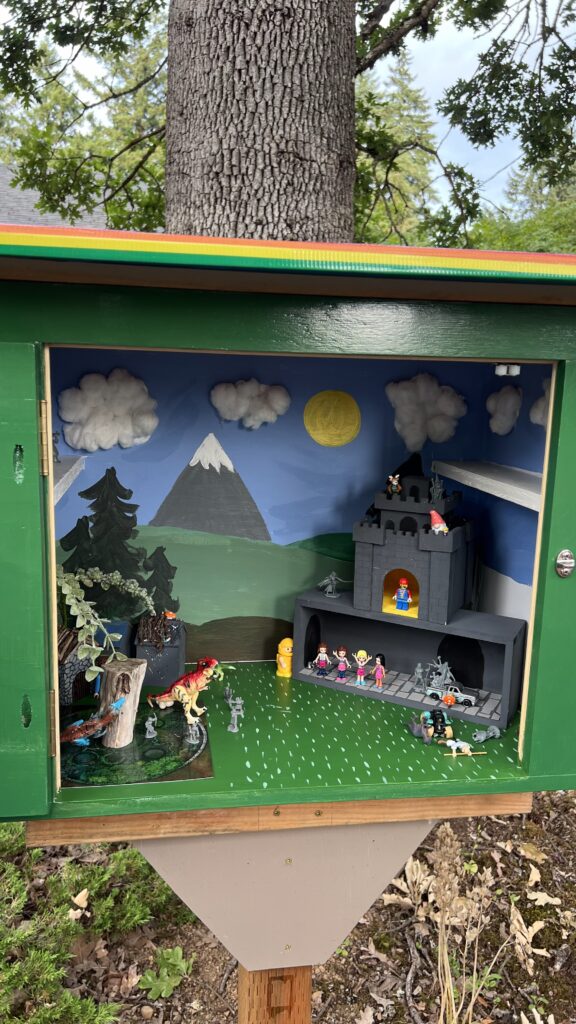
It just opens up imagination, like being a kid and making those little dioramas out of a shoe box and how that was yours. That was your world, and you could imagine yourself going into these little places. That’s the feeling that kids have said they’re getting here.
They move the figures around and play with them and take pictures of their story. They leave little trinkets or minis and take some as well. That’s all part of it, and it’s been really fun.
I love that it’s so interactable!! We have a fairy tree in the woods near us that we build up with the community, and it’s SO MUCH fun.
It just makes the world more magical to have these little spots to visit! And kids love having an imprint on something then seeing how it’s changed later. Like… I put a leaf here, and now it’s still there but all shriveled! Having that touch point is important.
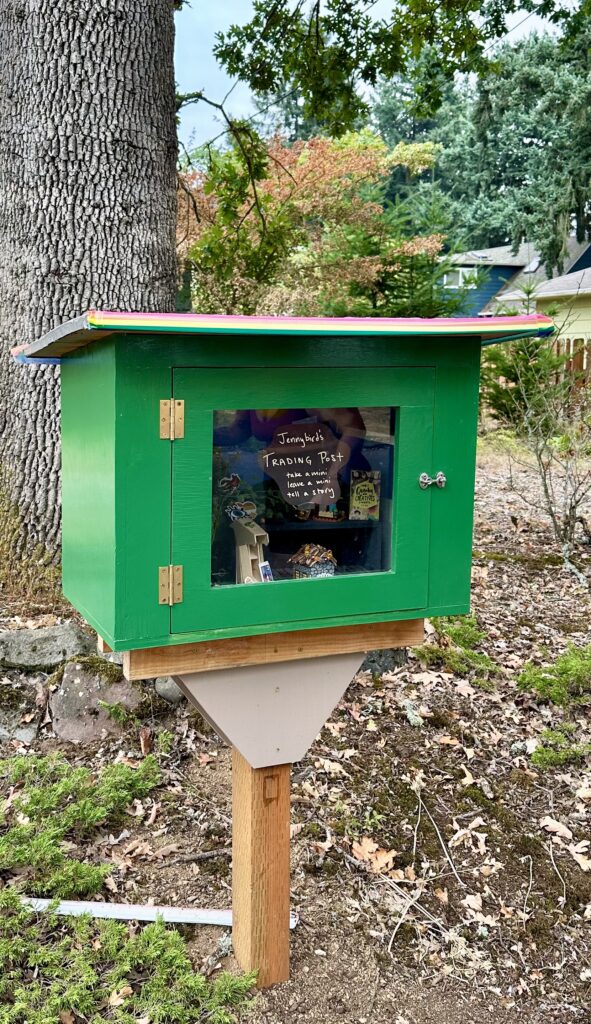
I think grown ups like it too because it can be hard to get kids out of the house for a walk or maybe they just need a break to check something out during their stroller walk, and it gives a little incentive to check out the mini box.
Right now, it’s the scene with minis, but I want to do dice trading and some magic wand trading as well. Then, I’m not sure how to do this because it rains so much in Portland, but I want to leave a place where kids can write or maybe record their story. It could be a telephone story where one kid starts it and another adds. I’m working those out.
One of your other areas of expertise is your speech therapy practice! Can you tell us a bit about how you’re using TTRPGs to help kids with speech therapy?
This is something I’m so excited about – I’m in the building stages now and hoping to start groups this fall (check it out here)!
I mentioned storytelling as a context for a lot of what I do, and particularly for elementary grade kids, storytelling is such an important skill to have because it’s everywhere. Kids connect with each other through stories. Kids empathize with different situations and scenarios through stories, they see through different windows into other worlds, they see mirrors reflecting themselves… It’s a naturally motivating experience to work on any sort of skill.

If you want to work on speech sounds, vocabulary, grammar, self advocacy, understanding problem solving, perspective taking. Everything is in stories.
It’s kind of a trick too, when I was in schools and working with kids who have lots of different goals in the same group… one working on speech sounds, one working on describing words and objects, one is on making a plan before they act… it’s like… how do I work on these individual skills with 5 kids as once?
Well, you make a story!
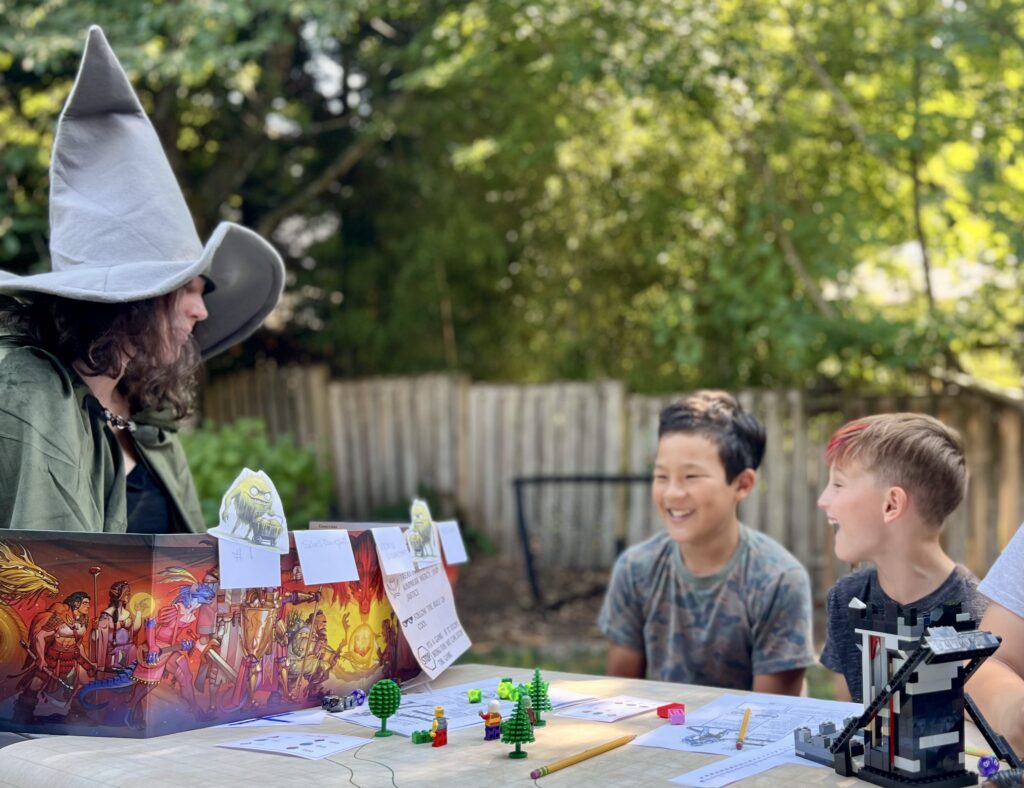
Each part of that activity can then work on one of those skills. Maybe you have a story where this kid is having trouble pausing and waiting before they act, so the story becomes about that goal and working on it in a positive way, but then there’s also the speech sounds throughout the story that you can highlight too.
So, I was gathering lots of narrative materials and trying to understand what stories are meaningful and motivating to the kids, and it was hard! I struggled finding a story or book that I thought EVERYONE would be into, and a lot of times, we would veer off track and make our own story anyway. We wanted to put our imprint on it.
We wanted to have some kind of control in the narrative that we were talking about.
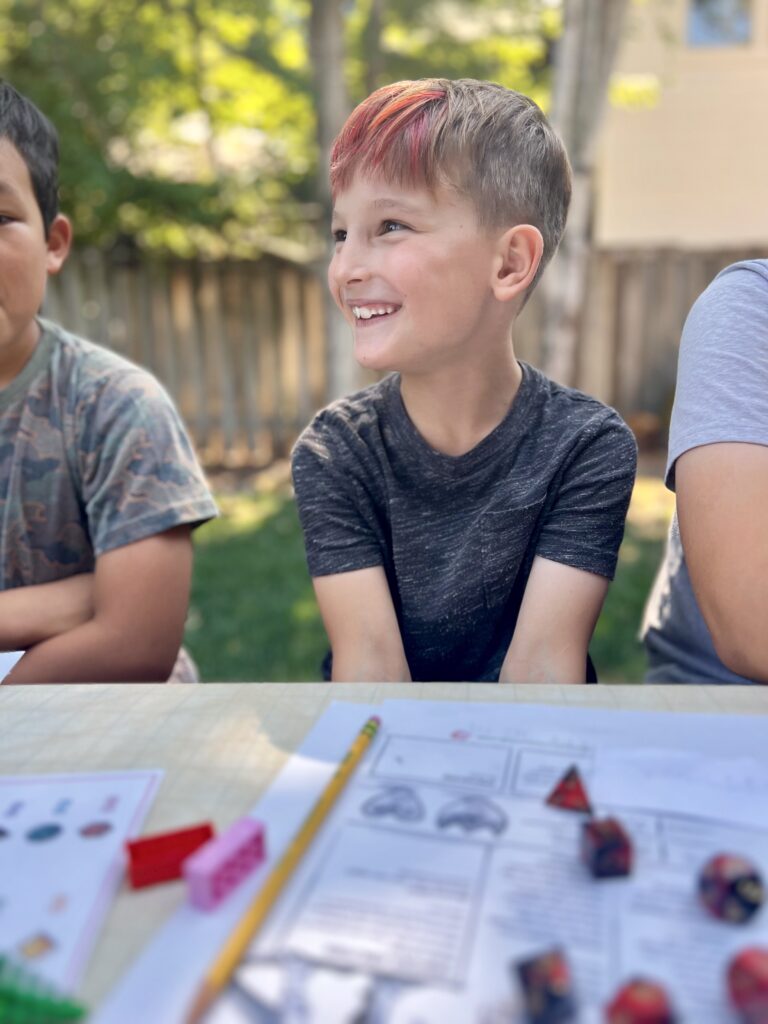
I went to a local game store, Guardian Games, and I met this person who was like, “oh, you’re a speech therapist? HERE!”
And she walked me through the whole place and gave me your book (Making a Tabletop RPG for YOUR Particular Kid)!
What?! AWESOME!!
She took me there first and said that this was what I needed.
I was like… WHOA!…. My mind exploded! This was what every single therapy session should be like! The kids create what they want to work on, what they want to do, and then I’m going to facilitate it! I’m just going to be along for the ride.
That’s what really good GM’s do too.
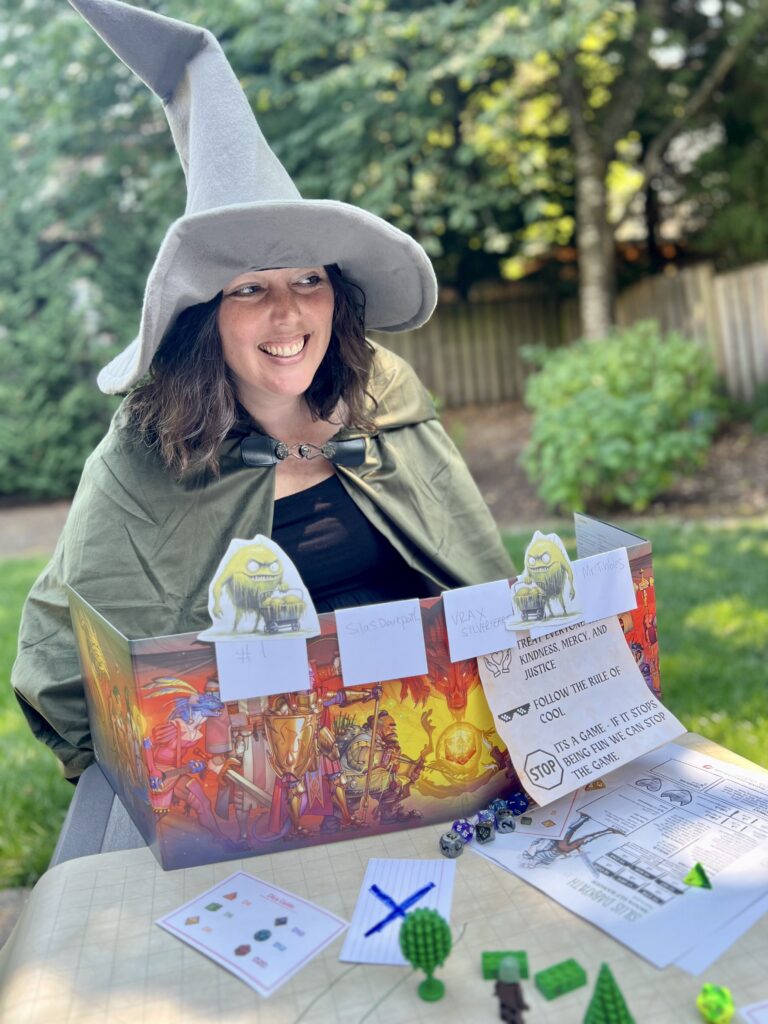
I started doing that in schools and adapting it to what I was working on. Speech therapists get really good at adapting materials, so it felt really natural to start GM’ing for my therapy students because that’s kind of what we do anyway. We’re all working on different things with different characters, and I incorporate the things they love into the game.
That’s where it started, and oh my gosh. The kids didn’t want to leave, and it was also so fun for me. It was really fun.
I decided that I wanted to make that my thing. I love working with all the kids on all the skills, so I have a lot of different things that we’re working on that’s not TTRPG focused, but I’m hoping to build up a lot of groups that have that TTRPG framework.
I did also take a course through Geek Therapeutics to become a certified therapeutic game master, and met some great folks there. I got some really great ideas! They focused more on the mental health side of using TTRPGs, but there’s a lot of crossover, particularly when they talk about being in community and working with other people on skills like self-advocacy.
I do that a lot with kids who are working with disabilities. We start with making sure they know how to say no and protest and say what they don’t want. There’s a lot of crossover there.
The connection is the most important thing with communication – it could be ideas, relationships, everything. I think that’s true for all therapy.
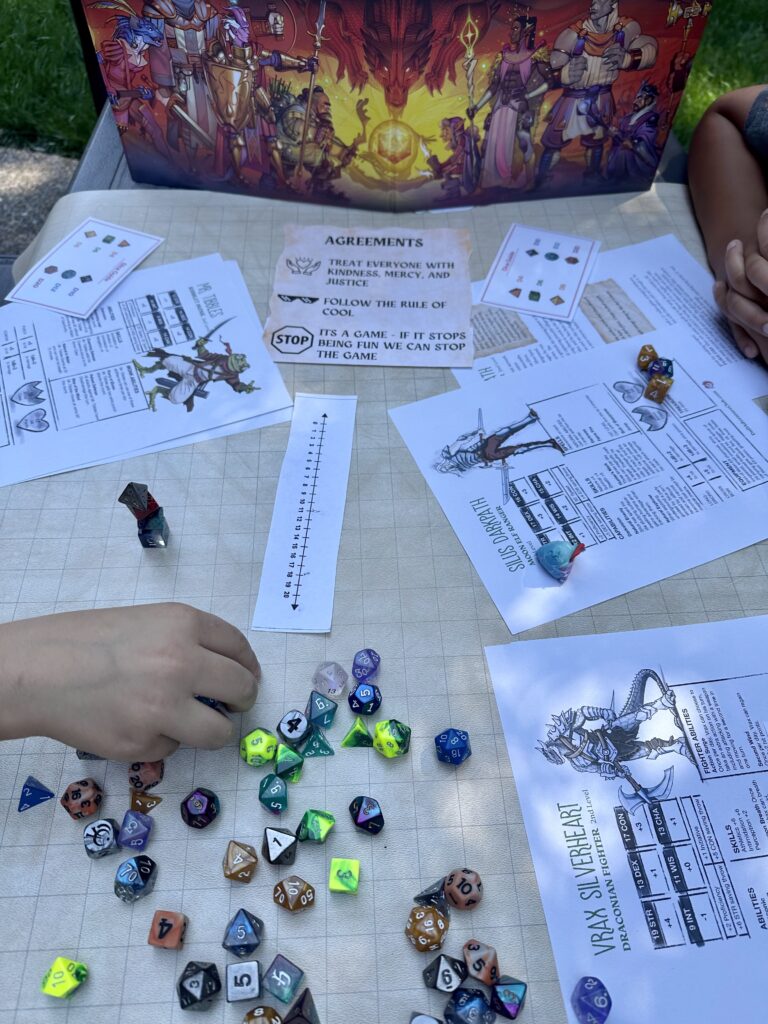
And the mechanics of the game become the rules-police. You aren’t saying that you said anything wrong, it’s just that you made a decision and there is a consequence because of the game. It’s so much more respectful, it’s not about right and wrong, it’s about being in charge of making your decision and what happens and how you feel about that now.
I’ve been playing these games now weekly just for fun, and it’s incredible how fast you make friends. And it’s not a group of people that’s super outgoing and makes friends fast; everyone at the table in the last session was like, “yeah, I have social anxiety” “I’m scared of talking to people” “I also have social anxiety”…
Then this last session, we were cracking up laughing the whole time and having inside jokes… It’s the same with the kids.
We don’t have to teach kids who are neurodivergent how to be “typical”. We need to create an environment where they can connect meaningfully and authentically with other people. This world of TTRPGs is the perfect place for that.
And I’m a newbie here. I’m not going to come in and be like… I’m going to change TTRPGs for speech therapy… because they’re already doing it. This is already a space that has been doing this for years and years, but I hope to give more people access to it and to give those accommodations and support that they might need to be able to play and do this.
You’re being intentional about it, and letting others know about it is so important too. I run into so many teachers using TTRPGs in class, but they never post about it, so they’re all working separately and not knowing how many are out there! What you’re doing is very important.
Do you have any advice for folks who want to start their own initiatives? What would be the key starting point? What helped you the most at the beginning?
I think if you’re a speech therapist or teacher or parent who wants to play with their kid and work on the skills inherent to the games, definitely start with TTRPGkids.
Well, thank you!
I’m totally sincere when I say you’re going to find what you’re going to need, and you’ll find links to dive deeper too. Like, I learned about Geek Therapeutics through your site.
Your zine too is just so easy to take and run with it.
A lot of folks at Geek Therapeutics and other places really want you to know the game REALLY well before starting to use a game. I agree with that, and also, the game can be as simple as you can make it.
If you’re a speech therapist, you know really well your scope and the skills that you’re working on, and it can be like anything else, like Sorry! and Connect 4. You’ll apply your same research base and your same therapy goals in. It’s just in an extra context.
For modification for younger kids, your website has so many indie games that are really great for that.
There is someone else I met, Dr. Alisha Springle, I don’t think her research has been published yet, but if you’re a speech therapist, keep an eye out for that because she’s working on research using TTRPGs, specifically D&D, for speech therapy groups.
Oh, and Game to Grow! They have podcasts on what it’s like to walk you through a session, and their book is really amazing. It has a lot of information about therapeutically applied TTRPGs.
Those are my first resources!
Well, thank you for the shout out, and I’ve added reaching out to Dr. Springle on my list. It sounds like she has some cool research going on.
Do you have any final shout outs or topics you’d like to cover?
I think we covered everything! I would just shout out Dr. Springle since she did meet with me early. The local game stores in my area: Board Bard Games taught me how to play D&D!
You can keep up with my mini library and TTRPG ideas for speech therapy at my facebook and instagram accounts as well!
Well, thank you very much, Jennifer, for taking the time to share your XP and about that work that you’re doing! I’m surprisingly flattered by the influence TTRPGkids had here, and I am excited to hear how both the Little Library and your speech therapy practice grow!
If you liked this post, make sure to subscribe to the TTRPGkids monthly newsletter to stay up to date on the latest reviews, tips and tricks, game and podcast list updates, and more! Thank you for playing tabletop RPGs with your kids and sharing this awesome hobby with the next generation!
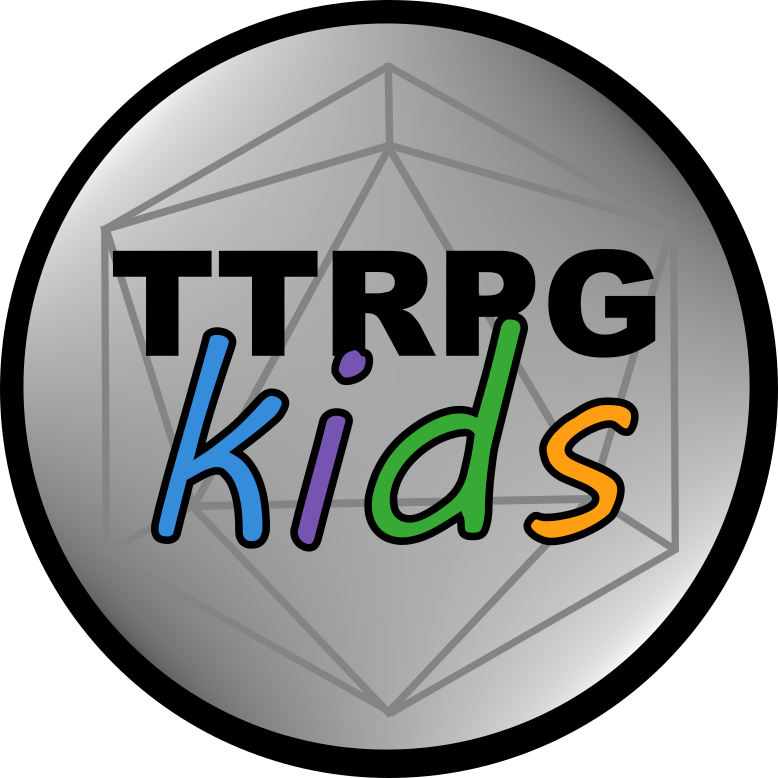


1 thought on “Interview with Jennifer Siler on TTRPG speech therapy AND her interactive TTRPG themed Little Library!”